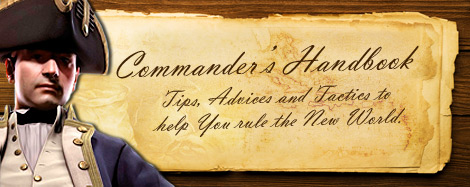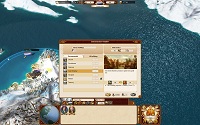- Overview
- Features
- System Requirements
- Designer's Blog
- Reviews and previews
- Commander's handbook
- Tutorial Videos
- DLC - Colonial Navy
- DLC - Pirate Treasure Chest
Your favourite new content in Colonial Navy DLC?
Vote » 27th September 2010:
27th September 2010:Adding content
We have just released first DLC for Commander: Conquest of the Americas. Additional content like this is something that breaths new air into a game.
Read more »
 Keep yourself posted on the latest news about Commander: Conquest of the Americas.
Keep yourself posted on the latest news about Commander: Conquest of the Americas.
Email-address:
 Sign up for the Paradox newsletter, and get all the news directly from Paradox Interactive.
Sign up for the Paradox newsletter, and get all the news directly from Paradox Interactive.
Email-address:


Commander's Handbook



1. Colonies need people
Colonies need people. Ensure that you ship enough colonists from your Home Port to the colonies. The colony population not only defines the size of the area the colony controls, but also the amount of resources the colony gets.
- Kim Soares
2. Coastal ships
Coastal ships. There are two kinds of ships: coastal and ocean going. Coastal vessels are cheaper but they have limited range and cannot cross the Atlantic ocean. You can only build coastal vessels in a shipyard that's located in you colony.
- Kim Soares
3. Process same items in one place
Process same items in one place. Production buildings cost money to buy and you have to pay monthly upkeep as well. With higher level buildings the costs can build up very fast. It's often more cost effective to build the production facilities of a certain item into just one of your colonies. Then use, preferrably coastal, ships to transport the item in question from your other colonies that produce the same item.
- Kim Soares
4. Listen to the advisors
Listen to the advisors. But do not obey them blindly. Each of them is interested only on his field of things. The military advisor does not bother himself with money or trade for example, he just want's more warships and forts. If he says you should build a fort into your colony he's usually right, but you're the one that should think of the big picture.
- Kim Soares
5. Threats are part of the diplomacy
Threats are part of the diplomacy. In diplomatic negotiations you can check the box to enforce the deal you're offering with a threat of war. Your nation has to be stronger than the nation you are negotiating with for this to have effect. Other nations do not like being threatened, but it could be the straw to tip the scale. You can even threaten other nations to be your allies.
- Kim Soares
6. Keep the colony morale up
It is important to keep colony morale up since it has a large impact on the rate that resources are collected. Keep your Hospital level high enough for the amount of colonists you have or colony morale will go down fast. It also helps to build buildings like Church that increase the morale.
- NG-Juho
7. Each factory is an investment
It's not always good to rush to the highest tier of goods - even if you can afford building a whole chain right away. Processing of some resources requires multiple buildings and is so expensive that returning your investment from them will take many years. Sometimes it's a much better choice to earn lower profit on basic resources or intermediates during that time and keeping all the money constructions and upkeeps would cost for other needs. Steel is a great example of such a chain, rushing to the highest tier at the beginning of the game is very much possible - but will handicap your enterprise for a long while. At the same time trading with intermediate products of the chain - Iron - could provide you with very good profits without having to pay a big investment bill.
- Delra
8. Use a hub-colony
Instead of having each town connected to your home port, set up a hub-system. That way you can use large convoys with protection to transport the goods between the colonies and Europe, while smaller convoys without escort (Sloop's!) can run between your colonies and your hub. That way you can cut costs.
- Thorin
9. Use the waiting time on automatic trade routes
If you're using automatic trade routes that go from a single colony directly to the home port, let your ships wait a few months for their cargo to fill up. 2 to 3 months should be picked at least.
- jordarkelf
10. Early territorial expansion
Immediately after you start your first colony, you should go back to Europe for 50 more colonists and start a second one. That's what the other nations do - only with a small delay - so if you don't settle down in your 2nd city soon enough but wait, most of good spots will be taken quickly.
- Delra






